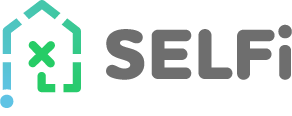Okay, so you have equity in your home, you need cash, but you’ve been told that you do not qualify for a cash-out refinance or a home equity line of credit. What are your options?
First, exhaust your refinance search
A cash-out refinance is usually the least expensive way of converting equity into cash. So before exploring alternative options, search for a lender that has more lenient qualifications.
SELFi Second Look specializes in helping borrowers refinance when traditional banks will not.
That said, if you truly cannot qualify for a refinance, here are three alternative ways to convert your equity to cash:
![]()
“SELFi started with a simple idea: to offer the absolute lowest interest rates. That's it.”
Option 1: Sell a percentage of your home
Instead of selling your home outright, homeowners now have the option to sell only a small percentage of their home.
This enables homeowners to convert a portion of their equity into cash while remaining the owner.
Here’s how it works:
An investor, like Unlock, offers to buy a small percentage of your home, usually between 5% and 10%. The sale price is determined by an appraisal.
The investor then pays you for fractional ownership and files a deed of trust on your property, similar to a lender.
There are no payments due to the investor.
The investor is paid when: 1) you sell your home; or 2) you choose to buy back the equity within a negotiable period, usually between 5 and 30 years. Often you can pay off this lien when you qualify for a refinance.
The investor shares in the appreciation of your home. Alternatively, if your home depreciates, the investor loses money.
This option works well for homeowners that need cash to pay off debt and improve their financial situation. This is because you can take cash-out without increasing your monthly expenses.

There are options to convert your equity into cash other than refinancing.
Option 2: Reverse mortgage
If you are 62 years or older, a reverse mortgage allows you to convert your equity into cash.
The product was conceived to help retirees with limited income use the equity in their home to cover living expenses.
You can receive the payout in the form of a lump sum or monthly payments, or a combination of both.
You receive the cash for as long as you live in the home. If you move or pass away, you or your heirs will have 12 months to refinance into a traditional mortgage.
Option 3: Sell your home and rent it back.
I do not recommend this unless you’re really desperate, but another option to convert your equity into cash is to sell your home outright and then rent it back.
Here’s how it works:
First, an investor makes an offer to buy your home and lease offer for rent payments. The offer is determined by the appraised value.
Second, you receive cash for a percentage of the equity in your home, usually up to 70%.
Third, you remain in your home as a tenant.
Unlike with a fractional sale, the investor is responsible for paying insurance and property taxes.
You have the option to either buy back your home or sell the property.
The buy back period is usually between 3 to 5 years. If you choose to buy back your home, you must qualify for a new mortgage.
If you want to move and get cash for the remaining equity, you can list the property with a realtor of your choosing.
This option serves homeowners who are in dire need of cash but expects to be in better financial circumstances in the future.
Beware of Loan Sharks
If you’re struggling with money and feeling desperate, you are susceptible to being preyed upon. So beware of loan sharks and avoid working with unlicensed investors.
SELFi works with a network of legitimate investors. We have vetted each investor to ensure they are properly licensed and transparent with all terms.
If you have equity in your home, and need cash, we can help. Often arrangements can be made that are mutually beneficially to the homeowner and investor.
Email us at hello@SELFi.com for solutions without the sales pitch.
Subscribe to our mailing list
Stay up-to-date on interest rates, loan options, and money saving tips.

